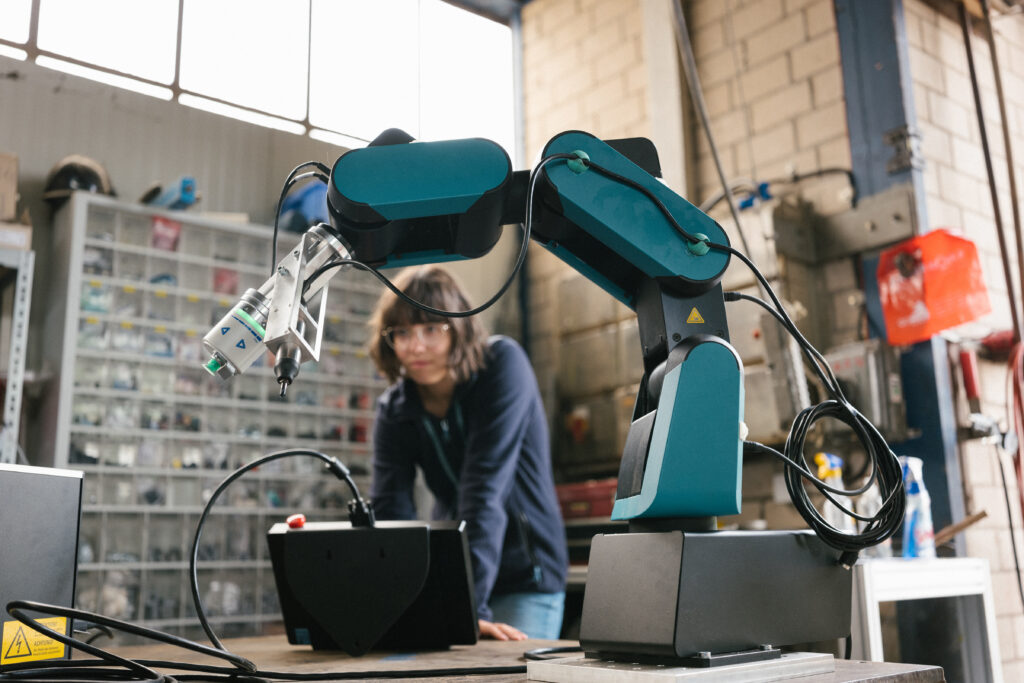
The Open University (OU), Radboud University (RU), Maastricht University (UM), Utrecht University (UU), University of Twente (UT), University of Amsterdam (UvA), Vrije Universiteit (VU), and Wageningen University (WUR) are working on this theme. The theme coordinator is prof.dr.ir. Wolter Pieters (RU).
Mission
For a successful embedding of new technologies in our complex society, a thorough understanding of not only these technologies themselves, but, crucially, also of how humans engage with them, is needed. We cannot make technological developments responsible and sustainable without understanding how people interact with those technologies. Work under the theme ‘The Human Factor in New Technologies’ (HiNT) aims to achieve this understanding through the multi- and interdisciplinary lenses of social sciences, empirical humanities, and adjacent fields like artificial intelligence and cognitive neuroscience.
Subthemes
HiNT has established a framework of four core subthemes: Making Tech Work, Seeking the Truth, Becoming Real, and Tech Changing Lives.
Making Tech Work
New technologies are often seen as innovative and inevitable. But their features do not always fit human practices, capabilities and motivation. For example, users may feel overburdened with administrative tasks, and decision makers may feel at a loss when asked to check decision recommendations by AI. By elucidating human-technology interactions at different levels (individual, team, organization, society), Making Tech Work shows how social sciences can play a key role in developments towards socio-technical systems that work – and contribute to empowerment and responsibility for decision makers, employees and citizens.
Seeking the Truth
Digital technologies shape how we seek, construct, and contest truth. This subtheme brings together research on the role of social media, AI, and other digital systems in shaping public understanding of reality. It explores how (mis)information spreads, how trust in institutions and media evolves, and how people seek and evaluate (potentially conflicting) information. At the same time, it examines how AI models search for, generate, and validate knowledge, raising questions about bias, transparency, and credibility. It also considers the implications of these developments for democracy, governance, and public debate.
Becoming Real
In today’s media-saturated world, the line between reality and illusion is vanishing. From Extended Reality (XR) and generative AI to deepfakes, synthetic media, neurotechnology, and robots, these technologies challenge our understanding of what is real. Becoming Real dives into three pivotal topics and associated questions: (1) how humans experience, perceive, and manipulate reality, (2) the profound impacts on society, organizations, and individuals, and (3) the powerful forces shaping our sense of reality, from corporations to regulators. Our mission: to illuminate and navigate this transformative era.

Tech Changing Lives
Tech Changing Lives studies how technology affects behaviour, values, and social practices. It explores the ethical design and effects of digital interventions that can shape behaviour positively or negatively. Technologies like activity trackers can motivate healthier lifestyles, but they also raise ethical concerns. We examine impacts of digital technologies on individual, group, and societal levels. This subtheme involves interdisciplinary research with experts and users to design solutions that improve well-being, learning, and sustainability, while also addressing ethical issues in design.

Progress
We are working on these themes with around 70 sector plan staff and associated staff from eight universities. A yearly action plan guides the initiatives towards the goals of the sector plans. The joint events in April 2024 and May 2025 were successful in terms of establishing connections, and further events will be structured around the subthemes. Sector plan collaborations, based on regular meetings of the coordination team, also led to several joint grant proposals, a book proposal, a new shared course, and more activities are underway. We are actively identifying ways to amplify educational impact beyond individual departments and faculties, seeking opportunities for broader institutional benefits.
In terms of societal impact, new collaborations were established with societal partners, and sector plan staff is actively engaged in impact institutes of the associated universities. The sector plans also clearly facilitated collaboration with other sector plan themes, both on a national level and on a local level, in particular with the cross-cutting SSH theme.
